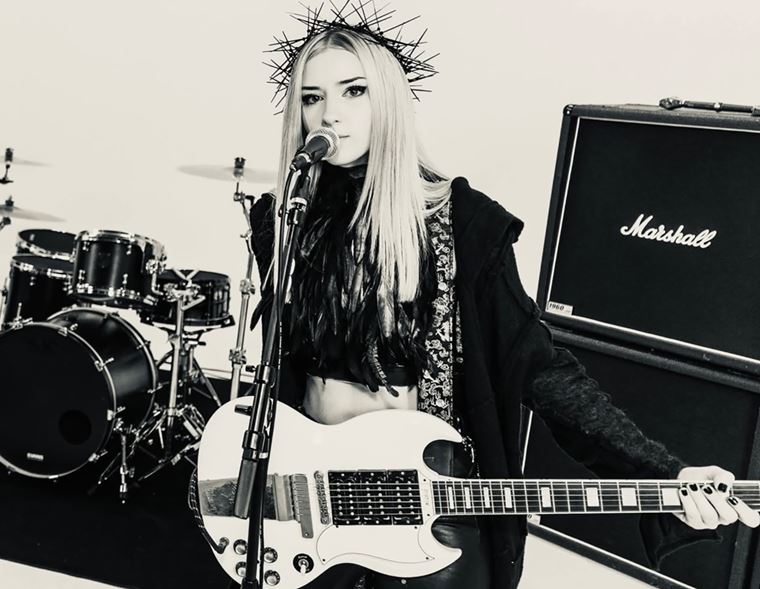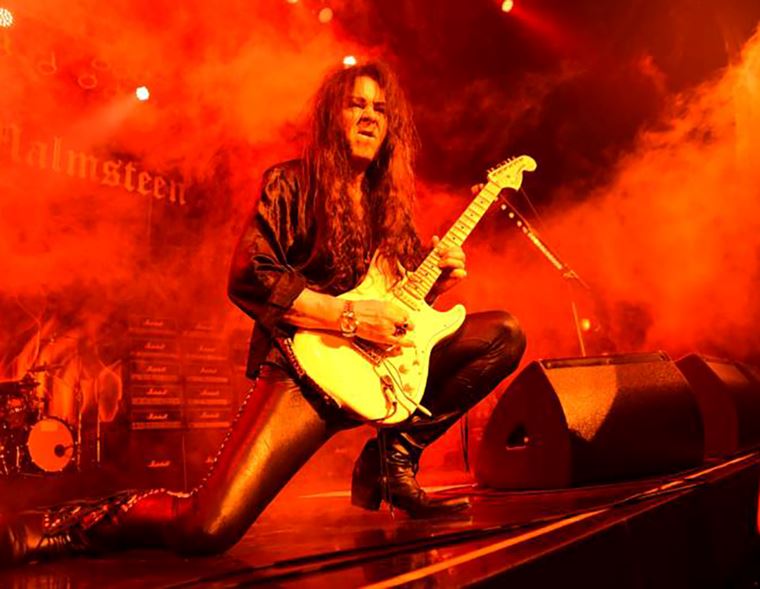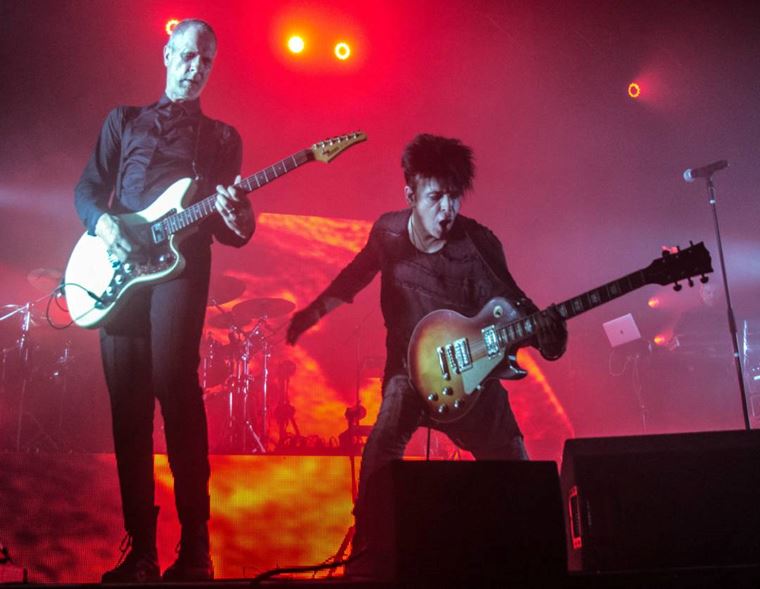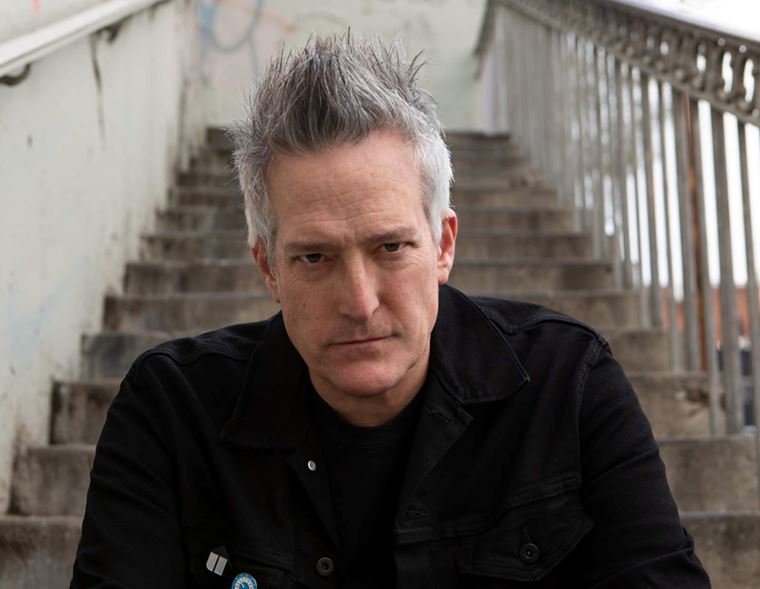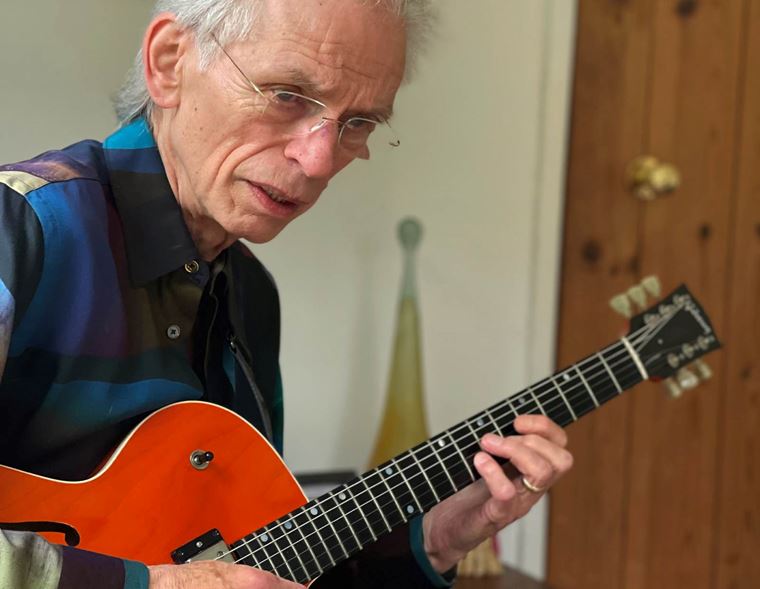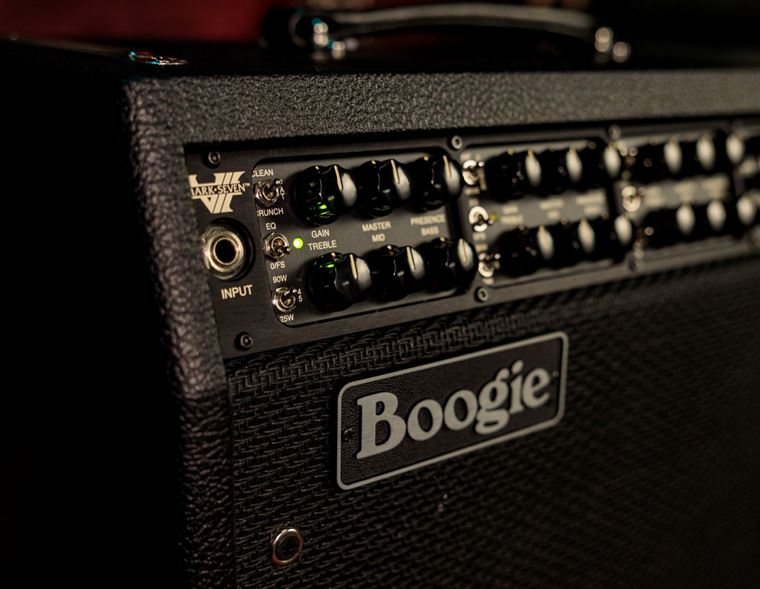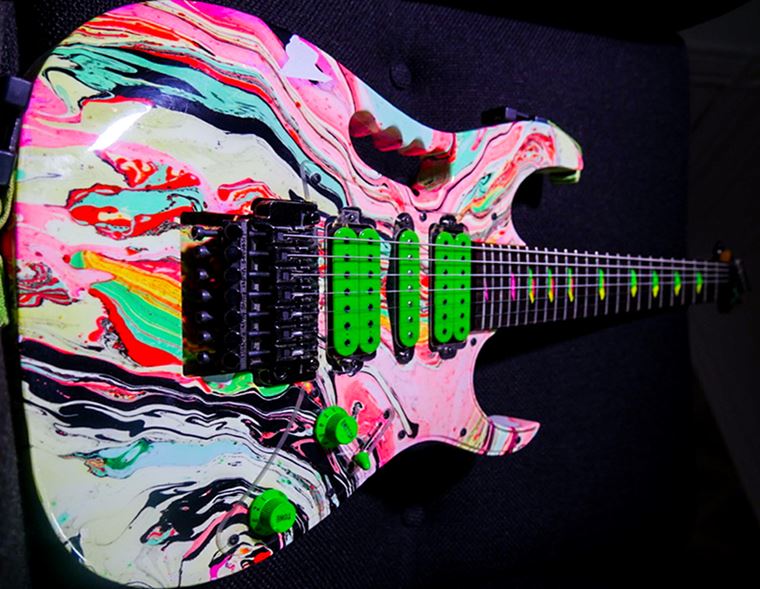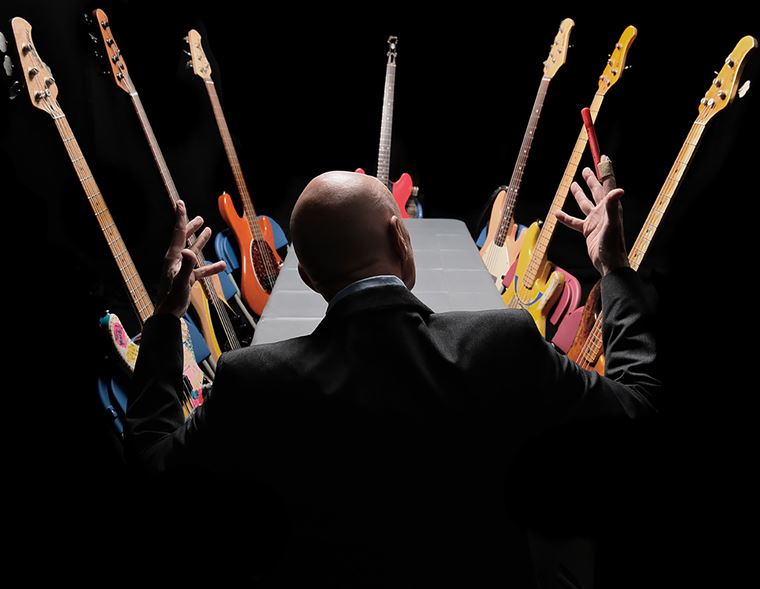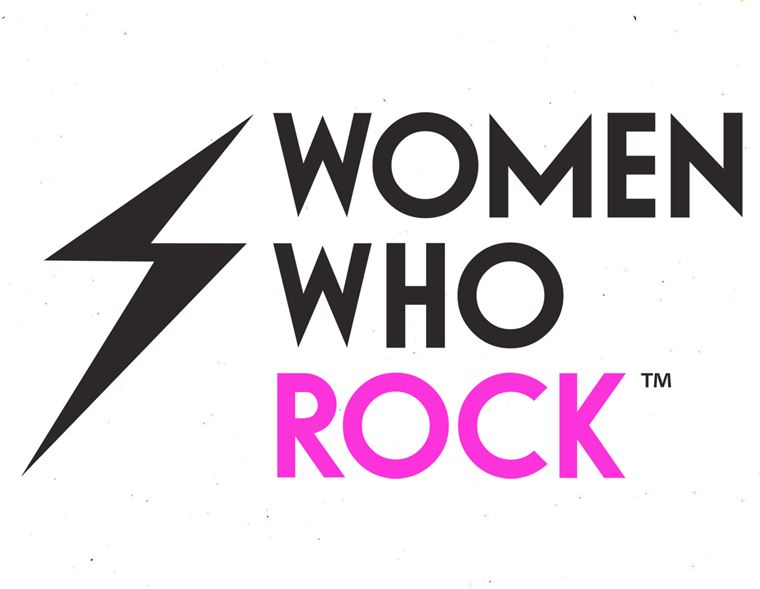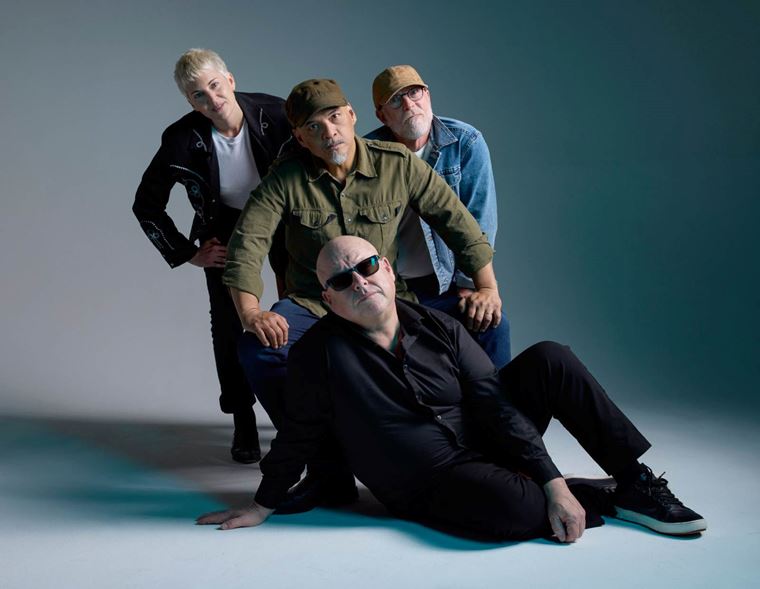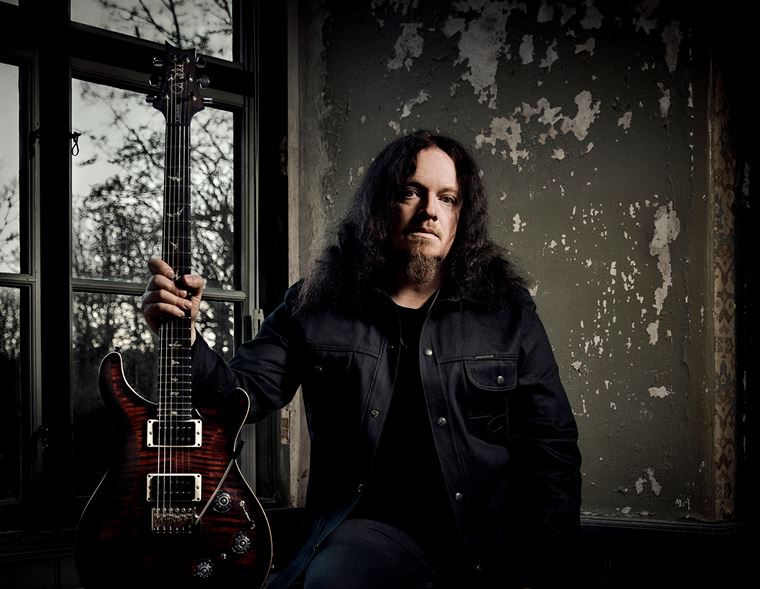The guitarguitar Interview: Hugh Cornwell
Published on 29 November 2019
I make my way up a long hill through the autumn weather, toward a hotel somewhere in Edinburgh to meet Hugh Cornwell. He’s on tour to support his newest record, Monster, and later on tonight he’ll play two separate sets: one of solo material and another of Stranglers hits. Crisp golden leaves crunch underfoot as I trudge on, considering the forthcoming interview.
Hugh seems to be a most interesting character. Reading through his autobiography, A Multitude of Sins, as research for the job, I’ve learned about his training as a biochemist in Sweden, his early days with the Stranglers living in drummer Jet Black’s off-licence, of the onslaught of the Punk movement in London and of Cornwell’s incarceration on drugs charges. It’s definitely the stuff of a proper Rock biog, and I can’t help but wonder what the man will be like in person. This is doubly the case since I’ve also been ploughing through YouTube videos of live Stranglers performances and scoping Cornwell’s snarling, sullen persona.
Hard as it may be to believe, this year marks 30 years since Cornwell called it a day with the Stranglers to go solo. Tonight sees him accompanied by a bassist and drummer, making a tight power trio for an energetic run through some new material and some enduring hits. In terms of his solo career, Cornwell has issued 9 studio albums, and has worked with reputed producers Tony Visconti (David Bowie) and Steve Albini (Nirvana).
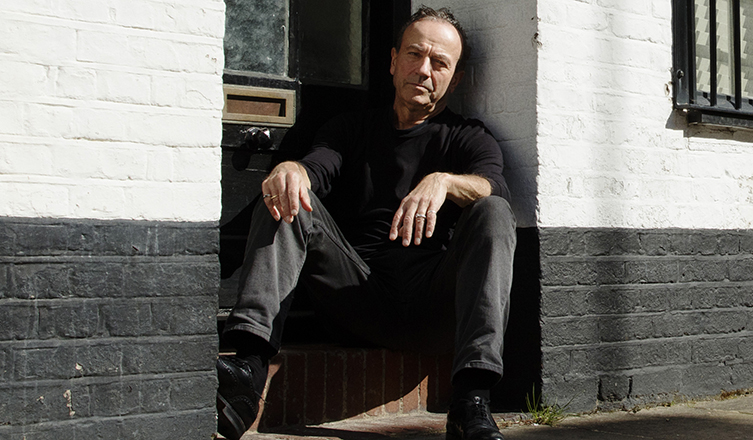
(Photo: Bertrand Fevre)
His newest record, Monster, is the focus on the first part of our conversation. It’s an album populated with characters ranging from Hugh’s own mother to Mussolini, taking in Sergeant Bilko and Eval Knievel along the way!
That’s quite a dinner party!
I reach the hotel at the top of the hill and head in, finding a soft sofa to decamp on as I await my alloted interview time.
Not long after, a tall, baseball-capped figure carrying two teacups approaches me as I sit in the hotel foyer.
“Green tea?”, asks Hugh in greeting. I'm instantly relaxed. Though a fixed point of energy on stage, the offstage Hugh Cornwell is a laid back and friendly person, happy to chat about whatever comes up, with no hint of that on-stage snarl. I'm glad!
After saying hello and telling him my name, he replied without missing a beat: “Ray? You created a monster today!”, quoting his own song Monster and referencing the great Ray Harryhausen, maker of special effects and the man after whom I’m named. We laughed, shook hands and carried our green teas to another comfy seat away from the reception area in order to have our chat.
Whilst being here to talk ostensibly about songwriting and guitar playing, I knew that Hugh is also a published author of fiction and wanted to learn more about that, as well as his creative process generally. Hugh was, as I’ve mentioned, happy to chat about anything, so we delve into this later on in the interview.
One thing I felt like dodging, though, was the usual Stranglers patter. A quick five second Google search can get you all of the info you need on the currently amicable but quite separate Stranglers situation, and I felt no need nor desire to drag out those tired old questions about splits, reunions, or back catalogues. It’s well-trodden journalistic ground, to say the least. From reading Hugh’s book, I knew there was tons more to ask about anyway! Hopefully, any Stranglers fans reading this will appreciate this and enjoy the different roads we travelled down instead. That isn’t to say we don’t bring the Stranglers into it: far from it! It’s a big part of his creative life, after all, and I’m happy to have been able to ask him about my favourite Stranglers song, Strange little Girl, amongst other things.
The story begins here, near a stone fireplace at an empty breakfast area of a hotel in the Murrayfield area of Edinburgh...
Guitarguitar: So, Monster! Before we even get into the songwriting, which is what I want to know about more than anything...
Hugh Cornwell: Oh, ok.
GG: I wanted to talk about the overall sound of Monster. It’s pretty ‘live’ sounding. Did you guys do a lot of live tracking, of the drums and so on?
HC: No, no, no, in fact, believe it or not, all the drumming is programmed.
GG: No! Really?
HC: Yeah! My engineer, Phil Andrews, who used to actually play keyboards with me with I first left the Stranglers – I had a five piece line-up: two guitars, bass, drums & keyboards – and Phil, who I met through Roger Cook (Nashville songwriter), joined when I formed CCW with Roger and Andy West. So, I inherited him from that. He actually ended up playing on Guilty and the one before that, Wired.
We started working in the studio together because I realised he was a very good engineer. He can play nearly any instrument anyway! He’s good at drums, so between us, we programmed all the drums. I’d give him an idea, explain it to him and he’d go: ‘Okay, give me a little while with that’, and he’d spend a few hours on that.
GG: Yeah.
HC: Then I’d go back and say: ‘Yeah, I don’t like the sound of that hi-hat’ or whatever, and slowly...it took a long time!
GG: It does!
HC: And a lot of people have been fooled by it, which is great.
GG: I program drums a lot and I thought it was a live performance! It worked!
HC: Yeah, it’s great!
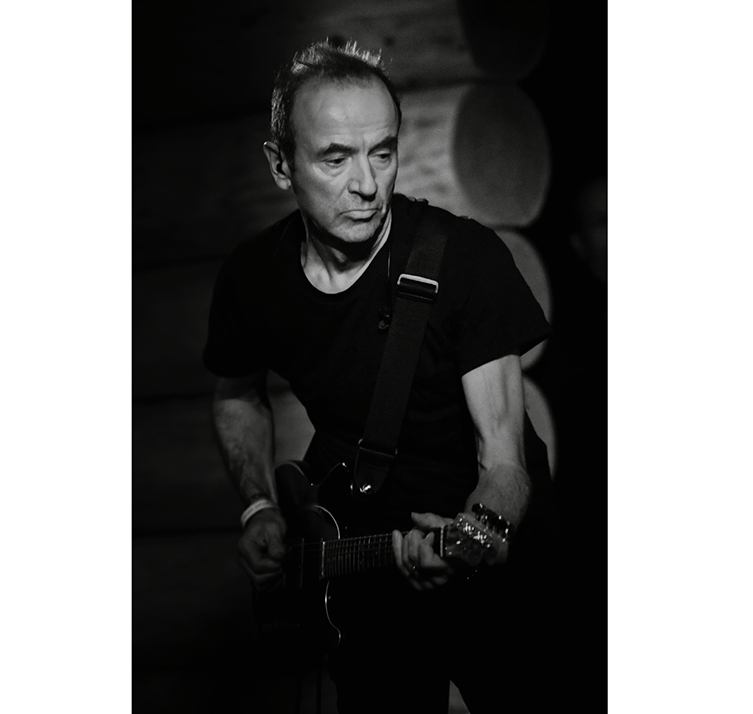
(Photo: Micah)
GG: That brings me, I guess, to the theme of the album itself. What I got from it is that there’s a lot of characters.
HC: Yeah, yeah.
GG: There’s Mussolini, Lou Red...and, of course, you’re Mother’s in Le Grande Dame.
HC: Yeah.
GG: That song was the genesis for the album, wasn’t it?
HC: That’s right, she was the first one, yeah. She was the first one, and then...it wasn’t something, it wasn’t: ‘well, I’ve written a song about my Mum, let’s have a few other songs about other people’. I was watching a movie about Eval Knievel, who I knew nothing about. But I knew he did these jumps over things, but I didn’t know much about him. I’m really into movies and this film had George Hamilton playing him and I thought: ‘Well, that’s gonna be interesting! I gotta have a look at that!’ So, I looked at it, and I couldn’t believe the life this guy had had! How infamous he was, and quite a character! You couldn’t make up his life story. I checked it out because I thought they’d made some of it up but nearly all of it was absolutely accurate! It really had happened.
And the next thing I realised was that no one had ever written a song about him, which is unusual because, with the old motorbikes and all of this - and think of Easy Rider and Born to Be Wild - there’s always this association with motorbikes. I’m not a motor biker myself, but I know about the association. The idea of the music came, and the title came, and then I had two! I had my mother and I had Eval Knievel! And one by one, all the others just appeared.
So, it wasn’t a plan from the beginning, it just ended up like that.
GG: So, with that in mind, with a song like Pure Eval, you thought ‘I want to write a song about Eval Knievel’.
HC: Yeah.
GG: Then what? Do you sit down at the guitar and just play?
HC: No, I was driving around Scotland, I think. This is going back three or four years. I think I was doing an acoustic tour. I thought, it’s got to be up-tempo (starts drumming table), thinking LA Woman (Doors song)...
GG: Oh yeah, totally.
HC: And then ‘Pure Eval’ came into my head. I thought, ‘Well, his name’s Eval, so pure Eval...’ (laughs) fits in with my back catalogue, sort of. My associations. So then as soon as you’ve got the title, the tempo, it’s just filling in the dots after that.
GG: Really? It comes that easy?
HC: Yeah, it came out really easily. Yeah yeah yeah.
GG: So, all of a sudden you’ve got some songs happening...
HC: Yeah.
GG: Do you write more than you need?
HC: No, I only write to spec, (laughs) these days. I used to write all the time. I think, early on in your songwriting, you have this sort of Protestant work ethic. A guilt thing. ‘I have to be writing songs, that’s what songwriters do. They write every day, and they get inspiration every day’, and you try to do this, and you realise that it doesn’t work like that. You write when you get an idea, that’s when you do it. There’s no point searching for them: they come to you. They just come.
So nowadays, every few years I get a feeling that I’ve got some songs to write. I don’t know what it is, it’s like a premonition, a sort of awareness that something’s gotta come, musically. And you can’t put a time on it, but for many years, since I left the Stranglers, I’ve been doing an album every four years.
GG: Yeah.
HC: But Monster was six years after the last one. The reason is because we did it all in-house, just the two of us. Also, the album was finished nearly a year and a half before it got released, but we had to find someone to release it, and then it’s got to be mastered, and then they gotta schedule the release date six months, nine months ahead otherwise there’s no point. Suddenly, you finish the album and it won’t be out for 18 months! So that’s why it’s ended up being six years this time. But I’ve already got this feeling: it’s come back!
GG: Oh, cool!
HC: So, as soon as the tour finishes, I’ve got some writing to do.
GG: When you have that feeling, do you write when your touring at all? Does that ever happen?
HC: No, but I’ve got some things in here (points to his head).
GG: And they’ll stay there until the time comes?
HC: Yeah, yeah, I’ve worked a couple of them out: ‘Yeah yeah, that’ll work’, ‘yeah, that’s an interesting idea’, ‘got a subject for that, yeah, yeah, yeah, alright’ ‘better file that one away’ (laughs) but there’s no point working on it...I like going into a studio, in a recording situation, with something only 70-80% fixed. Then, it’s what comes out when you’re putting it on tape. That’s the way to stay interested, really. If you do it all by numbers beforehand...I’m very fond of ‘Eval’ for that reason. A couple of changes in the song structure really happened on a spur of the moment in the studio.
GG: Ok.
HC: And I’m glad it went like that, cos it’s got that feeling of undetermined wildness, I suppose.
GG: Yeah! I think that happens a few times in the record! In the Bilko song...there’s something I really like that happens in songwriting in general, and it’s when someone pulls the carpet out from under you.
HC: (laughs) Oh, yeah!
GG: Bilko has got a groove...
HC: Yeah, you’re into it...
GG: And then it just changes into this totally different groove half-way through, with the high-up guitar melody...
HC: Yeah, yeah, yeah! The slow bit.
GG: Yeah! With the vocal harmonies!
HC: Almost Zeppelin stuff.
GG: Yeah! But with beautiful vocal harmonies.
HC: Well, I just imagined in my head a procession of Roman legionnaires, or Roman priests singing, hundreds of them, singing praises to him!
GG: Haha! That’s awesome!
HC: That’s how that came about.
GG: Is that often how it is with your songwriting? Do you get images?
HC: Yeah, yeah! Absolutely, yeah.
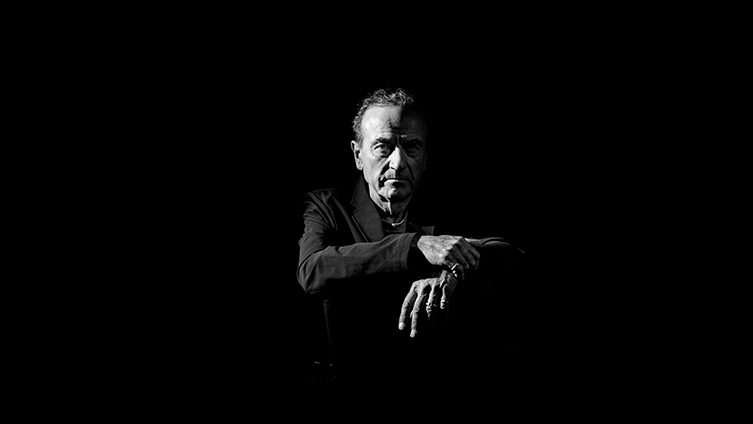
(Photo: Bertrand Fevre)
GG: Cool! One other thing, I don’t know if this is something you would agree with or not, but Monster has quite a lot of references to different types of masculinity.
HC: Really? I didn’t know that! (laughs)
GG: Haha, I reckon so! News to you?
HC: That’s great!
GG: Just because, you know, Eval Knievel, he was kind of a tough, macho guy; Bilko, who was a guy in charge, but nobody listened to him; and the Duche, who was of course a Fascist dictator. Lou Reed, who was quite subversive with his sexuality...
HC: Right.
GG: Different male power things going on there...lots of different portrayals there.
HC: Well, they’re all very different, you couldn’t really...I mean, my mother, obviously some of them are female and they are all very different.
GG: Sure.
HC: Yeah, I mean, there would be no point in writing a song about Barbara Stanwyck (classic noir actress), or Olivia De Havilland (actress from Gone With the Wind), or Headey Lamar or Marlene Dietrich, because you’ve got that type of character represented, so that’s why they’re all quite different.
GG: Yes, films. I was actually gonna ask you if you were a big movie fan.
HC: Oh, totally! I’ve got a movie podcast going.
GG: Oh, really?
HC: It’s assessible through my site or independently. It’s called Mr DeMille FM, it’s all one word. It was a streaming website for two years but now we’ve converted it to a free podcast. Now the shows can be downloaded, people can listen to them, they don’t have to be connected, basically. Podcasts are the way to go. And it’s all programs about...I do most of the narration, sometimes a guest narrator comes in. John Cooper Clarke has done some narration for me, Franc Roddam, the film director, has done some narration for me.
There’s a programme about Nic Roeg (legendary director of Don’t Look Now, The Man Who Fell To Earth and other great films: Ray), and Franc was a big friend of his. I know Franc and said: ‘I was thinking about doing a show in memory of Nic Roeg, would you like to narrate it?’ And He said, ‘I would love to do that, but I’ve never done it before!’ (laughs) And he was great!
I get the chance to do interviews: I’ve interviewed Frank Roddam, the Quadrophenia director, but that’s not up yet, about his career. And when I’m doing an interview with someone, they pick their favourite film music and we play a little segment. And if it’s a program about someone’s career, then we’ll play bits of music from their films.
GG: Yeah, it completes the picture.
HC: Yeah! Bit of music, bit of talk, you know? Someone was listening to the streaming site and said: ‘You need to turn this into a podcast’. I said. ‘Really? Why?’ And they said: ‘It’s interesting stuff, punctuated by music!’ I mean, this is what podcasts are all about!
GG: Yeah!
HC: So, that’s what we’ve done!
GG: And do you like film composers, too?
HC: Yeah, I tried to get in touch with Cliff Martinez through a friend, but I can’t raise an answer out of him. I’ve tried Jonny, uh, thing from Radiohead...
GG: Greenwod.
HC: He hasn’t replied. I mean, the people who do the scores tend to be more reclusive and harder to get than the actors and directors, funnily enough. (laughs) Yeah, they haven’t replied. If it gets big and powerful, people will be queueing up to do it!
GG: Exactly!
HC: That’s the way you gotta look! And it is growing: we’ve had nearly a thousand downloads already in the three months, out of nothing, so.
GG: These things have to take a little bit of time.
HC: Of course!

(Photo: Robert Kenney)
GG: So it goes. One thing that I noticed when I was re-reading your autobiography: you seem to be someone who trusts his instincts really strongly.
HC: Oh yeah, yeah, you have to! Otherwise I wouldn’t have left the Stranglers. Or I wouldn’t have stopped being a biochemist.
GG: Those were the two main things that drew that conclusion for me!
HC: Yeah. Suddenly: ‘That’s what you gotta do!’
GG: And does that come into play creatively too? In your decision making?
HC: Yeah, I think so. Yeah! Absolutely.
GG: It’s an important part. It’s like what Tom Waits once said: ‘The way you do anything is the way you do everything’.
HC: Yeah, absolutely right! No, that makes sense!
GG: So, let’s talk about guitars!
HC: Sure!
GG: The one that I really like is this one (passes across Hugh’s autobiography to show image of a Black Telecaster with a modded middle pickup), this Telecaster.
HC: Oh, I love Telecasters! I’m not sure if I’ve still got that one.
GG: This one has an extra pickup. A lot of Stranglers fans talk about this one.
HC: Oh! It’s got a humbucker in the middle.
GG: Yeah! Like a DeArmond, or a Gretsch pickup or something. Filter’Tron or something.
HC: I’ve gone right off those. I mean, I search for guitars and I look for unadulterated Teles. If it’s got an extra one, I don’t even look at it. I like the classic. I dunno, maybe I got that because I was suffering from a lack of self-confidence or something? ‘Oh, I need another pickup!’ (laughs) I think, yeah, I think at that time, I was just finding out what kind of role I played as a guitarist, because if you’re in a band with another guitar, then you’re either playing rhythm or you’re playing lead. The two jobs normally get separated, don’t they?
GG: I guess so, normally.
HC: But if you’re in a band with a keyboard player, and a bass player who’s playing very melodic stuff, almost like a lead guitar...
GG: It is like that!
HC: For a long time, I was very confused about what my position was as the guitarist, which would probably explain why I’ve got an extra pickup in there. Since I’ve left (the Stranglers), I’ve realised that, I mean, I’m only one guitar now, and I know about the dynamics of playing chords and the dynamics of playing a lead line. I’ve got a pretty good sense of where each one fits. In order to do that, all I need is two: the front pickup and the back pickup.
I love the Tele sound! It’s just...the pure Tele sound is lovely.

GG: Yeah! Your actual guitar sound is really distinctive. I can always tell your sound.
HC: Oh, okay!
GG: Has it always been the Vox AC30 amps you’ve used?
HC: Yeah, I love Voxes. They’re a bit hard on the road: they do go down quite a lot. Gotta keep changing the valves, and the valves are getting harder to get! But I do have a backup Blues DeVille. A couple of years ago, I was having so much trouble with the Voxes, I thought (sighs) ‘I’ve gotta go to the Blues DeVilles.’ You can get a pretty good sound out of them, but they are very much more powerful, so they’re almost harder to keep under control. That’s the lovey thing about the Voxes: although they’re only 30 watts, the output is higher.
GG: Staggering, they’re very loud!
HC: Yeah. So, um, I got one Blues DeVille and meant to get another so I could get rid of the Voxes, but I never got around to getting the other Blues DeVille! So, I’ve got my Blues DeVille to remind me to keep an eye on those Voxes! I don’t use it, so it’s just sitting there, saying: ‘Keep an eye on those Voxes. I’m always here!’ (laughs)
GG: ‘I’ve got your back!’
HC: Yeah, he’s covering my back! But I really like the Voxes, I hope I can keep them going.
GG: Yeah! Is that where you get the overdrive and stuff from? Do you have pedals at your feet?
HC: Yeah, I’ve got pedals, but very simple. When I started becoming a three piece, I realised that you have to have some sort of effects to create different textures. And you look at what some of these people have got, I mean, I remember doing a thing with Jack Daniel’s, a Battle of the Bands thing, and there was a band in there called Joy Formidable.
GG: Yeah.
HC: And you look at the bloody pedals this girl’s got, she’s got a pedal board the size of these two tables! (laughs) And so when I started getting pedals, I’m looking at these bands and thinking: ‘What the fuuuuck?’ (laughs) You know? What’s going on here? And I thought: I don’t really want to get that into it, cos it could get to the stage that, if you don’t have your pedal board, you can’t play. You’re lost, you know? And I thought, I don’t wanna go that far, but I could do with some pedals.
I knew about Boss pedals; I’ve used them before. So, what do you need? You need an overdrive, so you can get an extra boost for some lead playing or something. Then you need some sort of echoey thing, to create a big sort of space, and then you probably need some sort of an envelopey thing, a tremolo or a wah (makes a long ‘wah’ noise), something like that. If I’m playing some of the old Stranglers numbers, I have to mimic some of the keyboards.
GG: Yup.
HC: So I’ve got the old Hendrix Sonic Shifter, I think it’s called. Phase shift, I think it is.
GG: Oh, yeah, yeah, yeah.
HC: And that does, just occasionally, I’ll use that. But it doesn’t get much use. And then a tuner. And these are all Boss, except for the Phase-Shifter, which is a Euphonics, or something? Is it called Nuphonics?
GG: Univibe? Electro-Harmonix?
HC: No, it’s a very old one anyway.
GG: Univox?
HC: I can’t remember!
GG: Haha, fair enough! (I later find of that it is, in fact, an Electro-Harmonix Small Stone Phaser).
HC: And then, just recently, I found this great new thing...it’s blue and it does all these great things, including an octave divider. I can cover lots of different options for different numbers in this one pedal, getting special sounds that I need. And that’s just come in for this tour, for one number.
GG: Oh cool, so we’ll hear that tonight?
HC: Yeah, yeah. That’s why it’s there. It’s for the first track on Beyond Elysian Fields, called Land of a Thousand Kisses. I used Tony Visconti’s baritone guitar on it, baritone Tele. What a fucking beast that is! Amazing sound! And I can mimic it using this pedal.
GG: I see, using the octave effect.
HC: Yeah, and I need it and it’s great. It works really well. That’s all the pedals I’ve got, all Boss, simple stuff, you know. (The pedal in question turns out to be a Boss PS-5 Super Shifter: Ray)
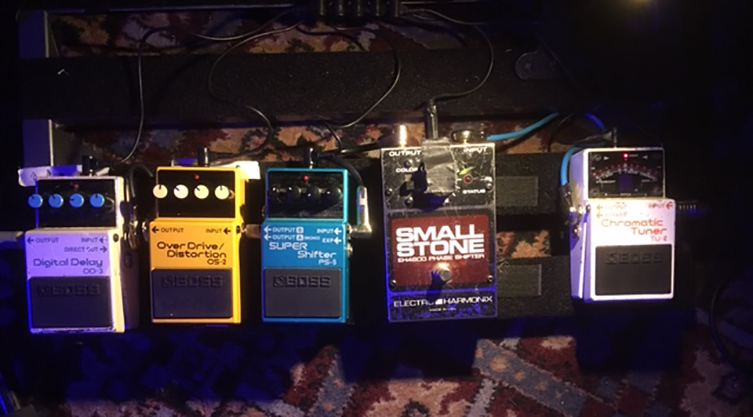
(Photo: Phil Andrews)
GG: It means they are strong and replaceable, so if something dies, you can just switch in another.
HC: Yeah, yeah, you can get replacements very easily.
GG: In terms of your actual lead guitar parts, I’ve always thought you were underrated as a guitar player. I don’t know how you feel about that, but I’ve always thought your lead parts were very stand-out moments in your songs.
HC: Well, they’re never improvised.
GG: I was gonna ask that!
HC: I do very little improvisation because I’m not very good at it. People keep saying: ‘Come on and jam!’, you know, ‘No, because if I do, I’ll be useless!’ I can’t really...I’ll play a lot of bum notes! Um, I only do that sort of improvisation if I’m simulating a keyboard solo in an old Stranglers song. Then I’ll wig out a bit and take a few chances. But if it’s my guitar parts, they are written as lead guitar parts, so there’s hardly any improvisation there.
GG: When you go to write the solos, do you tend to feel a melody coming, the same way you would do for vocals and then just transcribe it?
HC: Yeah, yeah (hums out a melody), you know?
GG: Yeah, because they are very melodic. Like the one from First Bus to Babylon.
HC: Oh yeah.
GG: Very melodic. And the Golden Brown solo, it’s quite unusual, the note choices.
HC: Yeah, yeah, yeah, well, again, it’s all melody. There are so many guitarists out there who are brilliant guitarists, and they can do a solo, and they can just do a million notes a second, but it’s not actually saying anything.
GG: No.
HC: It’s just saying ‘I can play fast and I don’t play any bum notes’. But that, to me, doesn’t really...to me, if there’s gonna be a lead break, it’s got to be a servant to the song. So that’s why, if I put a lead guitar break in, it’s got to contribute something. Melody, or vibe, or something.
GG: Yeah. One of my favourite Stranglers-era tunes...
HC: Ok.
GG: I don’t want to talk too much about the Stranglers...
HC: No worries, it’s alright.
GG: ...is Strange Little Girl.
HC: Mmmm.
GG: That song: I wondered how you felt about it, as the guy who wrote it. Because you wrote it, pre-Stranglers...
HC: I am very fond of that song. I’m almost fonder of that song than I am of Golden Brown. I wrote it with Hans Wärmling, who was the fifth member of the Stranglers. If you look at the writing credit under that song, it says Black, Burnell, Cornwell, Greenfield, Wärmling. Well, that isn’t actually correct. It should be Cornwell, Wärmling. The others took a credit because the whole catalogue was the Stranglers catalogue and we took equal part.
But it doesn’t explain the writing of it and I can remember to this day the day that...he was a very gifted guitarist, and he was a very gifted piano player, and he could play saxophone, and he could write songs, and he could sing backing vocals! And he had a great ear for melody, so he was a real genius guy, Hans Wärmling. He came over to join us, John and Jet and me, at my suggestion. He came over to join us as the fourth member, and he found a piano in one of the rooms of the off-licence we were living in. He went (adopts comedy Swedish accent) ‘Oh, a piano! Fantastic!’ And, rather than get his guitar out, he’s down at the piano (mimes playing the piano on the tabletop) and he’s there every day for about eight hours a day just playing and coming up with stuff.
I walked in there one afternoon and he said: ‘Oh, hello Hugh! I have this lovely melody today! We have to write a song with this!’ And he played the keyboard part for Strange Little Girl. I said: ‘That’s great, Hans! Let me get a piece of paper’, and we wrote it in five minutes.
GG: Wow.
HC: I wrote the lyrics on top of what he played. And so, I’m very fond of that song.
GG: That song, from reading the book (Hugh’s autobiography), originally, EMI said ‘no thanks’!
HC: (laughs) That’s right! I sent it as a demo!
GG: And they said no thanks.
HC: Not what they were looking for.
GG: No! And then, after the Stranglers were done with EMI, you gave them that song.
HC: Yeah, as a joke.
GG: It became a big hit! And then, twenty years later, one of my favourite songwriters, Tori Amos, did a cover of it!
HC: Yeah, a lot of people have covered it!
GG: That song has had quite a life!
HC: I know! That shows that the record companies don’t really know what they’re doing. But anyone can make a mistake, you know.
GG: They can, they can. I’m glad to hear that you’re fond of that song because that’s one of my favourite ones, I love it.
HC: Aww, yeah.
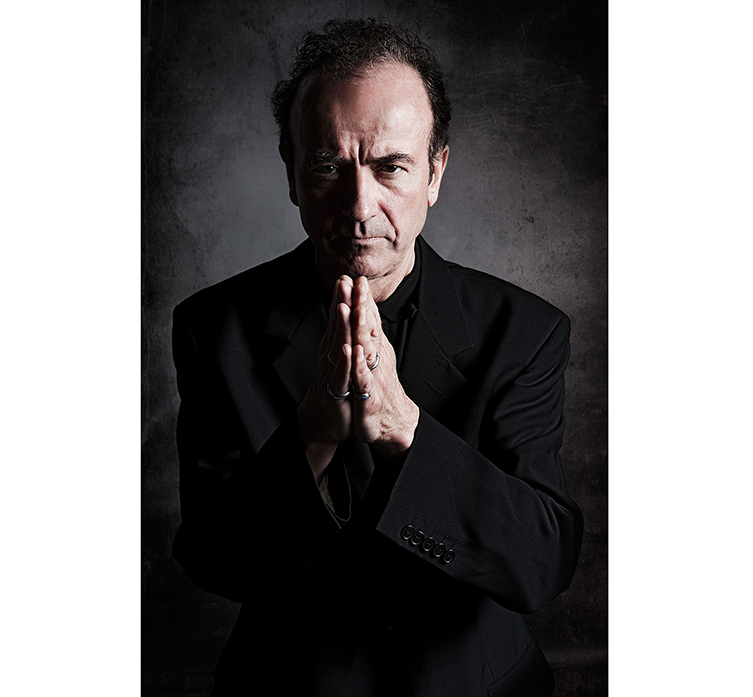
(Photo: Kevin Nixon)
GG: Beautiful tune. Now, a bit of a tangent here, but guitar-wise, what type of plectrums do you prefer?
HC: I use these grey ones. I think they’re Ernie Ball. Are they Ernie Ball? (brings one out, it’s a nylon Jim Dunlop) What’s that? Dunlop! And the reason I use these is because it’s got a grip. These smooth ones, I just drop ‘em, cos I sweat. (I compare his with my green .88mm Dunlop Tortex, which is habitually in my back pocket) Yeah, you see, I’d drop that. (laughs) That’s why I like Dunlops, because they’ve got this grip and I very rarely drop these.
GG: How heavy is that one?
HC: Well, I normally use the one...what’s the one below .88mm?
GG: That’s .73mm.
HC: (Looks at his plectrum closely) Actually, this is an .88mm. That’s too hard! I’ve got one .88mm by mistake. .73mm is the one. The nice thing about them is that, with all these Dunlops is that, when they get warm, they soften up a bit more, which is quite nice, so I keep them in a close pocket, you know?
GG: So they have a bit more ‘give’.
HC: Yeah, it gives them a bit more give.
GG: Yeah, fair enough! Now, one thing I wanted to talk about. You also write novels...
HC: Yes! Got another one coming in the new year.
GG: And it’s a Sci-fi novel?
HC: Yeah, it’s a sci-fi thriller. I’ve always been a huge fan of Philip K Dick (influential author who wrote Do Androids Dream of Electric Sheep?, the book which was filmed as Blade Runner - Ray) and in fact, I’ve done a podcast about him, about adaptations of Philip K Dick to the cinema. He’s one of the most adapted authors ever. It’s incredible.
GG: He’s also very under-read. Everyone watches the films, but not so many people read the books.
HC: Yeah! Absolutely! Yeah, yeah! So, I’ve always been a huge fan of him. So, after I finished my last one, I thought: ‘Wouldn’t it be great to write a Philip K Dick book?’ He’s my inspiration for it. First, I got the title: Future-Tense, and then I just got an idea for a story, you know?
GG: Yeah!
HC: But it’s a very bleak world that is being painted! (laughs) Very bleak world.
GG: And how far into it are you?
HC: Oh, it’s finished! It’s being published at the moment.
GG: Ah, brilliant!
HC: And it’ll be available in 2020.
GG: Amazing!
HC: Cos I’m on another one now. A Western now.
GG: Really?
HC: Yeah. What the world needs is more Westerns!
GG: I think they do!
HC: Everyone hates Westerns cos they’ve only seen crap ones! Or they’ve read crap ones. There are lots of great Westerns! You just gotta know where to find ‘em!
GG: Yeah, because it’s basically just good and bad fiction, really, isn’t it? Genre doesn’t really matter.
HC: Yeah, exactly! So, yeah, that’s the novel situation.
GG: Excellent. So, you keep the novels separate, creatively speaking, from the rest of it?
HC: Yeah, otherwise it wouldn’t be a break.
GG: Is that how you see it?
HC: Yeah, it’s a break. It’s doing something completely different.
GG: And when you’re writing a book, is there a discipline involved? Like, do you write every day, early morning, anything like that?
HC: Well, I go away for long periods of time. Weeks and weeks. And then I do two hours in the morning and two hours in the afternoon. And sometimes it goes into three, depending on whether I have to do research, or if it’s going well.
GG: Sure.
HC: If you do that seven days a week, you can get a thousand words a day so that ends up seven thousand a week. You can get a lot done. But you gotta get into a schedule that suits you, you know? I don’t do it all night, or first thing in the morning. Have a swim, have breakfast, then do a bit of writing. Then, yeah! Stop. Feel hungry now, have a nice lunch, have a walk around, have a think, go back: do a bit of writing. Then, oh! Sun’s going. Time to watch a movie! Then I can go to bed!
GG: That’s not a bad day!
HC: Simple, you know?
GG: And with your stories, do you tend to know how they’re going to end?
HC: No, the first one, I just had a beginning. I didn’t know how it was going to end up. The second one, I had a beginning and an end, but I didn’t know how to join them up. This one, Future Tense, I had a...uh, I had a rough ending for it, but then it changed a lot. You have to have a rough idea of where it’s going.
GG: But you have to be okay with it moving.
HC: But don’t stick rigidly to it. Just go with the flow. A friend of mine, who’s a writing coach, he told me once: ‘If you’re writing a book, a tip is to get out of the way of the story’.
GG: Yeah.
HC: When you first write, there’s a lot of the author in the story, a lot of autobiographical stuff. Slowly you get rid of that stuff. He said you’ve got to get yourself out of the story, get away, get out of it, to let the story carry on without you.
GG: And the characters will tell you what’s happening.
HC: Exactly, yeah.
GG: One last one, then, if that’s ok?
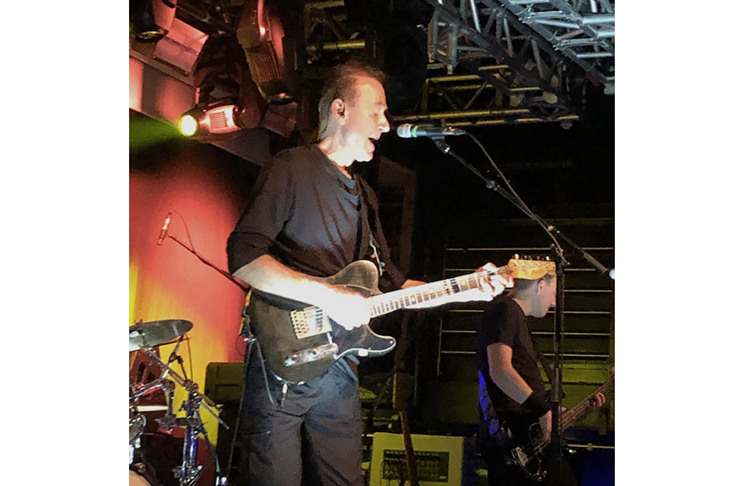
HC: Yeah.
GG: My perception, from reading the autobiography, is that the early days, with Hell’s Angels coming up, and you had windows breaking, rioting...there’s quite a confrontational attitude with the audience about getting a reaction?
GG: Yeah, yeah, yeah! But they...it must sound contrived, but they foisted it on us. I mean, when we started out, when Hans was in the band, we were a Soft Rock band. We were Soft Rock, with great, melodic songs! But the climate of that time, the early 70s, was so...the social climate, people wouldn’t believe how edgy it was. There was the three-day week, power cuts...suddenly the lights would go of for four hours, and no heating! Candles. The rubbish wasn’t taken away so there were rats. It was like it was real heavy stuff!
And so, when we played, the audiences were angry! Nothing to do with us, they were angry, and they were throwing stuff at us! We had to counteract that in order to survive. We weren’t gonna let them walk all over us! We thought: ‘Well, we’re gonna have to stick up for ourselves!’
GG: You had to meet it.
HC: Yeah, yeah!
GG: But the audiences today, it’s a whole different thing, right?
HC: Ah, completely different!
GG: So how do you get what you want out of it? Is there an engagement that still happens?
HC: Well, if they’re too quiet, I tell them they’re being too quiet! And it they’re being too noisy, I’ll tell them they’re too noisy. Just be honest with them!
GG: (laughs) Yeah, yeah!
HC: Or if you can’t hear what someone’s saying, or if you want someone to shut up, you tell them to shut up! They’ll appreciate your honesty. Too many people are dishonest with their audiences, you know? And, um, I think you’ve gotta come clean with them and they’ll respect you for it.
GG: Yeah.
HC: Hopefully!
Our time drew to a close. Hugh and I said goodbye, and Hugh collected our teacups before heading back towards the elevator to his room. I made my way out into the leaf-strewn street, which could now most definitely be described as Golden-Brown in colour, and reflected on a most enjoyable and down-to-earth experience.
The sold-out venue that night was packed with music fans of all ages. The bar sold two-pint pots, a new and entirely sensible concept to this writer. At 8 bells, three Men in Black took to the stage and erupted in a raw, focused and confrontational show that rocked and delighted the house. The two-set idea was a good one, allowing both bodies of work space to breathe on their own terms, acknowledging the ongoing art of the creator whilst giving the audience a big old bag of hits at the end. Everybody won.
Hugh is on tour now and continues into Japan in the new year. Visit the Hugh Cornwell website to keep up with his gigs, novels and movie podcasts!
Thanks go out to Hugh for talking to us, David for organising and Phil for helping out too.
Thanks for reading,
Until next time!


